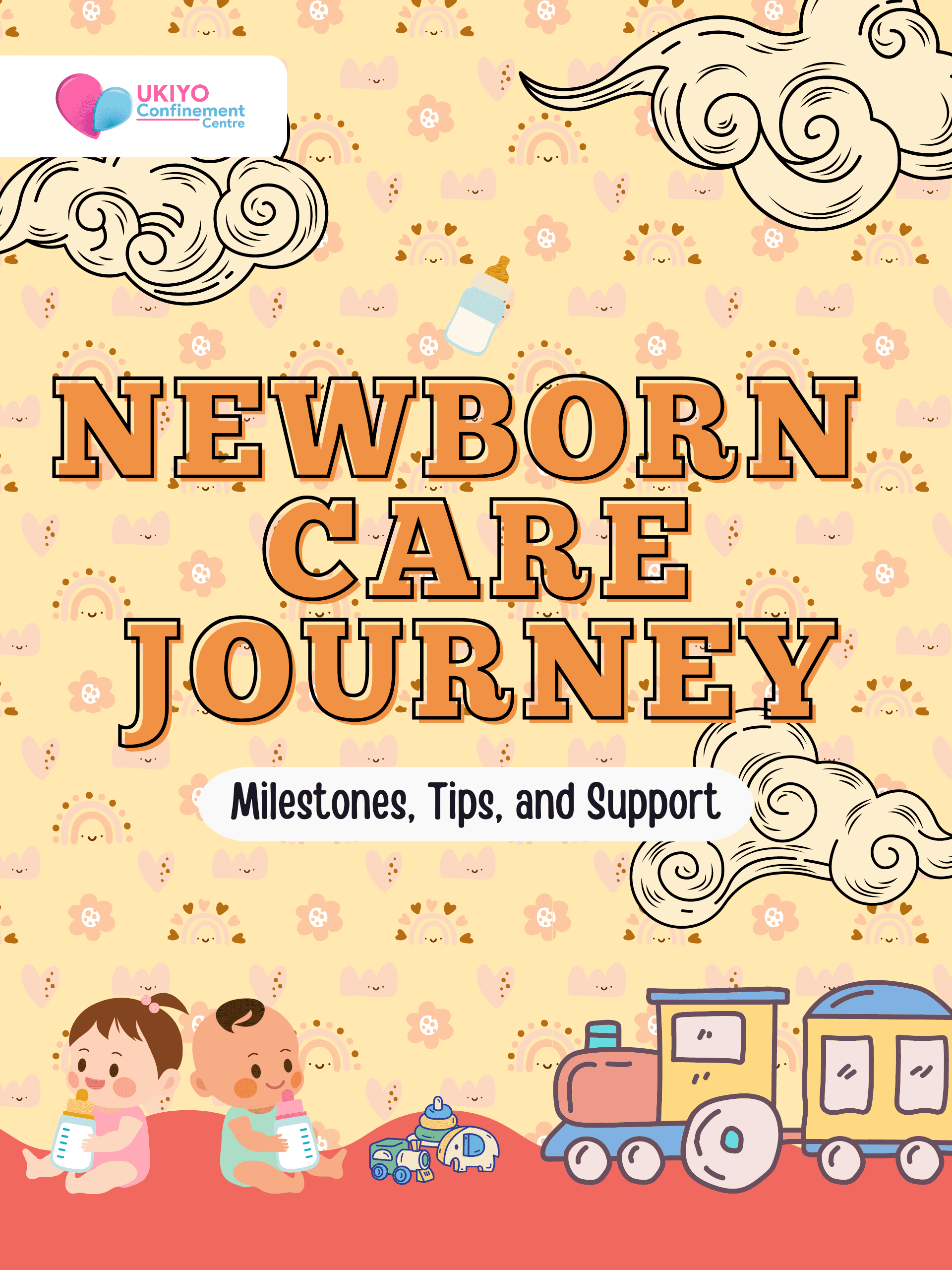

Ukiyo Confinement Centre
21/05/2024
Newborn Milestone Moments, Newborn Care Tips and Tricks, and Parenting Talk: The Role of Societal Support
Welcoming a newborn into your family is a joyous occasion filled with love, excitement, and, understandably, a bit of anxiety. As new parents, navigating the early days can be overwhelming. However, understanding key milestone moments in your newborn’s life, learning essential care tips and tricks, and seeking support from your community can make this journey smoother and more enjoyable. This comprehensive guide aims to help you through the initial stages of parenting.
Newborn Milestone Moments
Newborns grow and develop rapidly, and each milestone is a testament to their physical, cognitive, and emotional progress. Here are some key milestone moments to look out for in the first year:

First Month: Adjusting to the World
- Reflexes: Newborns are born with certain reflexes like the rooting reflex (turning their head when their cheek is stroked) and the grasp reflex (grasping your finger when placed in their hand).
- Senses: They begin to recognize voices, especially their parents’, and can see objects 8-12 inches away.
- Crying: This is their primary way of communicating needs such as hunger, discomfort, or the need for sleep.

Two to Three Months: Social Smiles and Coos
- Smiling: Around six to eight weeks, your baby will start to smile in response to your smiles and interaction.
- Coos and Gurgles: Babies begin to make cooing sounds, developing early language skills.
- Visual Tracking: They start to follow objects and people with their eyes.

Four to Six Months: Enhanced Motor Skills
- Rolling Over: Babies typically start to roll over from tummy to back and vice versa.
- Grasping Objects: They develop the ability to reach for and grasp objects, improving hand-eye coordination.
- Babbling: Early babbling sounds like “ba-ba” or “da-da” start, which is the foundation for language development.

Seven to Nine Months: Exploration and Mobility
- Sitting Up: Many babies can sit without support.
- Crawling: Crawling usually starts around this time, leading to more exploration.
- Stranger Anxiety: Babies begin to recognize familiar faces and may show discomfort around strangers.

Ten to Twelve Months: First Steps and Words
- Standing and Walking: Many babies take their first steps around their first birthday.
- First Words: Simple words like “mama” or “dada” may start to appear.
- Imitation: Babies begin to imitate sounds and actions, learning from those around them.
Newborn Care Tips and Tricks
Caring for a newborn requires attention to their physical and emotional needs. Here are some practical tips and tricks to help you through the early months:

Feeding Your Newborn
- Breastfeeding: Breast milk provides ideal nutrition and antibodies. Aim to breastfeed on demand, typically every 2-3 hours.
- Paced Bottle Feeding: If you are bottle-feeding expressed breast milk, use a paced bottle-feeding technique to mimic breastfeeding. This involves holding the baby more upright and giving them breaks to swallow and breathe.
- Burping: Always burp your baby after feeding to prevent gas and discomfort.

Sleep Tips
- Safe Sleep Environment: Place your baby on their back to sleep in a crib with a firm mattress and no loose bedding.
- Establish a Routine: Create a calming bedtime routine with activities like a warm bath, gentle rocking, or reading.
- Night Feedings: Keep night feedings calm and quiet to encourage your baby to return to sleep.

Diapering
- Frequent Changes: Change diapers frequently to prevent diaper rash. Clean the diaper area with each change.
- Proper Fit: Ensure the diaper fits well to avoid leaks but isn’t too tight to cause discomfort.
- Diaper Rash Care: Use diaper rash cream as needed and allow your baby some diaper-free time to help prevent rashes.

Bathing and Hygiene
- Sponge Baths: For the first few weeks, give your baby sponge baths until the umbilical cord stump falls off.
- Regular Baths: After the stump falls off, you can start regular baths. Use warm water and gentle baby soap.
- Nail Care: Trim your baby’s nails regularly with baby nail clippers to prevent scratching.

Clothing
- Layering: Dress your baby in layers to easily adjust to temperature changes. A good rule of thumb is to dress them in one more layer than you are wearing.
- Comfort: Choose soft, breathable fabrics and avoid clothes with too many buttons or zippers.

Soothing a Fussy Baby
- Swaddling: Swaddling can help soothe a newborn by providing a sense of security.
- White Noise: Soft, consistent sounds like a white noise machine can be calming.
- Movement: Gentle rocking or walking with your baby can help soothe them.
Parenting 101
Parenting a newborn involves more than just physical care; it also includes emotional and psychological support for both the baby and the parents. Here are some important aspects to consider:

Bonding with Your Baby
- Skin-to-Skin Contact: This helps regulate your baby’s temperature, heart rate, and stress levels, and promotes bonding.
- Eye Contact and Talking: Engage with your baby by making eye contact and talking to them. This helps with their cognitive development and strengthens your bond.

Understanding Your Baby’s Cues
- Crying: Learn the different types of cries to understand what your baby needs. Common reasons include hunger, a dirty diaper, or needing comfort.
- Body Language: Babies communicate through body language. Pay attention to signals like arching their back, clenching fists, or turning their head away.

Self-Care for Parents
- Rest: Try to rest when your baby sleeps to avoid exhaustion.
- Support: Don’t hesitate to ask for help from family, friends, or a babysitter to get some time for yourself.
- Healthy Lifestyle: Maintain a balanced diet and exercise to keep your energy levels up and reduce stress.
Societal Support
Parenting is challenging, and societal support can make a significant difference. Communities play a crucial role in providing resources, emotional support, and a sense of belonging.
Family and Friends
- Emotional Support: Having a close network of family and friends can provide emotional comfort and practical help.
- Shared Responsibilities: Relatives and friends can help with tasks like cooking, cleaning, or babysitting, giving parents some respite.
Parenting Groups and Classes
- Local Parenting Groups: Joining local parenting groups can help you connect with other parents, share experiences, and gain valuable advice.
- Online Communities: Online forums and social media groups can provide support and a platform to ask questions and share concerns.
- Parenting Classes: Many communities offer classes on newborn care, breastfeeding, and parenting skills. These can be very informative and reassuring.
Healthcare Professionals
- Pediatricians: Regular check-ups with your pediatrician are essential to monitor your baby’s health and development.
- Lactation Consultants: If you encounter challenges with breastfeeding, lactation consultants can provide guidance and support.
- Postpartum Care: Don’t neglect your own health. Schedule postpartum check-ups and seek help if you experience postpartum depression or anxiety.
Government and Community Resources
- Maternal and Child Health Programs: Many governments offer programs to support maternal and child health, including immunizations, nutritional support, and health screenings.
- Financial Support: Look into financial assistance programs for families, such as child benefits, tax credits, and subsidies for childcare.
- Workplace Policies: Understand your workplace policies on parental leave, flexible working hours, and remote work options to balance work and family life.
The journey of parenting a newborn is filled with memorable milestones, learning experiences, and moments of profound joy. By understanding your baby’s development, mastering essential care techniques, and leveraging societal support, you can navigate the challenges of early parenthood with confidence and ease.
Remember, every baby is unique, and so is every parenting journey. Trust your instincts, seek support when needed, and cherish the special moments with your little one. With love, patience, and the right resources, you can create a nurturing environment where your baby can thrive.



